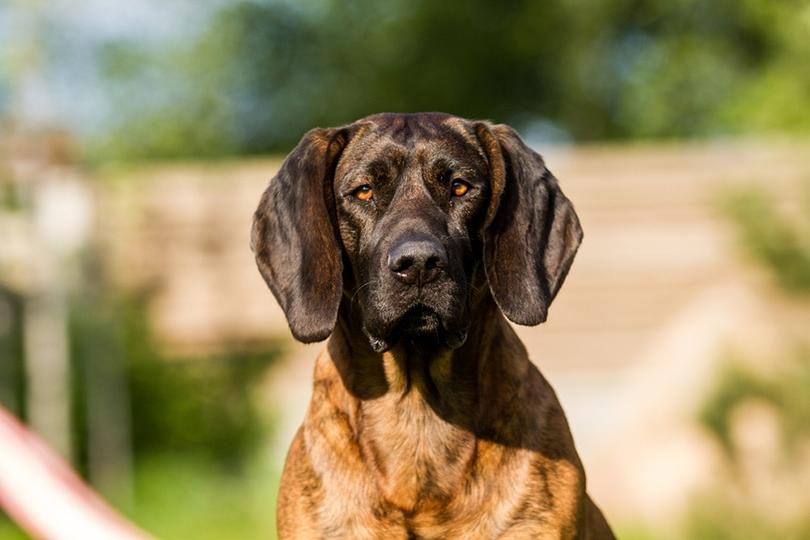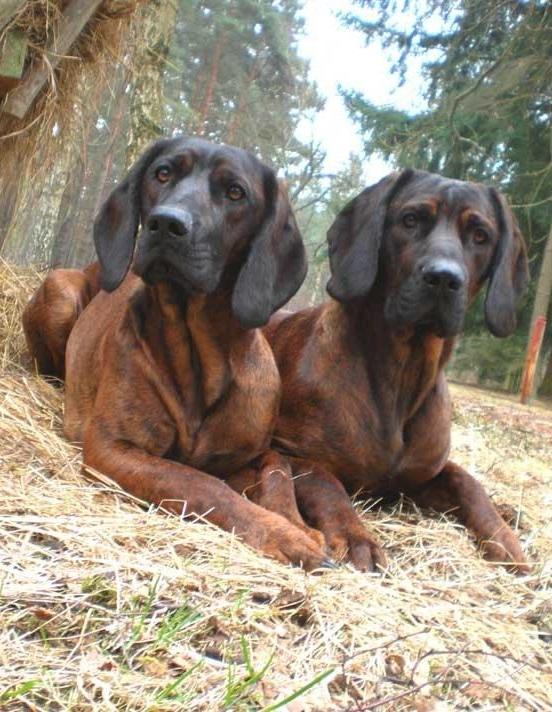- Breed Category: Hound
- Country of Origin: Germany
- Average Height: 48-55 cm (19-22 in)
- Average Weight: 30-40 kg (66-88 lbs)
- Average Life Span: 10-14 years
- Grooming Requirements: Low, occasional brushing
- Exercise Requirements: High, needs daily exercise
- Coat Type: Short and dense
- Coat Color Variations: Red, reddish-brown
- Shedding Level: Moderate
- Ear Type: Long and floppy
- Tail Type: Long and straight
- Temperament: Loyal, calm, and intelligent
- Intelligence Level: High
- Barking Tendency: Low
- Compatibility with Children: Good with proper socialisation
- Compatibility with Other Pets: Generally good
- Training Ease: Moderate, requires patience
- Common Health Issues: Hip dysplasia, ear infections
- Dietary Needs: High-quality, balanced diet
- Energy Level: High
- Drooling Tendency: Low
- Sensitivity to Weather: Moderate, prefers mild climates
- Overall Maintenance Level: Moderate
- Original Purpose: Hunting and tracking
- Year of Recognition by Kennel Clubs: 1996
- Apartment Friendly: Not ideal, needs space
- Best Suited For: Active families, hunters
- Cost of Ownership: Moderate to high
- Unique Traits: Excellent scent tracking ability
Imagine a dog with the tracking prowess of a bloodhound and the loyalty of a Labrador. That’s the Hanover Hound for you. This breed, known for its exceptional scent-tracking abilities, is a hidden gem among hunting dogs. In this article, we’ll dive into the Hanover Hound’s unique characteristics, rich history, and essential care tips.
Originating from Germany, the Hanover Hound has a storied past dating back to the 17th century. Bred primarily for hunting large game, these dogs were prized for their ability to follow a scent trail over long distances. Their lineage can be traced to the ancient bloodhounds, making them one of the most reliable scent hounds in the world.
Hanover Hound: A Glimpse into Its Development and Characteristics

Early Development of the Breed
The Hanover Hound’s roots stretch back to the 17th century in Germany, where it was developed for a specific purpose: hunting large game. This breed emerged from a careful selection process, blending the traits of ancient bloodhounds with local hunting dogs. The result was a hound with an unparalleled ability to track scents over vast distances, making it a favourite among hunters.
Role in Hunting and Tracking
Renowned for its scent-tracking prowess, the Hanover Hound excels in hunting and tracking. Its keen nose can pick up even the faintest of trails, making it indispensable in the field. Whether it’s tracking wounded game or following a cold trail, this breed’s dedication and focus are unmatched.
Key Historical Figures
Several key figures played a role in the Hanover Hound’s development, including German nobility who sought to create the perfect hunting companion. Their efforts ensured the breed’s characteristics were preserved and refined over generations.
Physical Characteristics
Physically, the Hanover Hound is robust and muscular, with a strong build that supports its endurance in the field. Its coat is typically short and dense, providing protection against the elements. The breed’s expressive eyes and long ears are not just charming but also functional, aiding in its tracking abilities.
Appearance and Unique Traits of the Hanover Hound

Appearance
The Hanover Hound is a medium to large-sized dog, typically weighing between 36 to 45 kilograms. Its coat is short, dense, and usually comes in shades of red or fawn, often with a black mask or saddle marking. These distinctive markings give the breed a noble and striking appearance. The breed’s muscular build and strong legs are designed for endurance, allowing it to cover long distances with ease.
Unique Physical Traits
One of the Hanover Hound’s standout features is its exceptional sense of smell. This breed has a nose that can rival any other scent hound, making it a master at tracking. Its long, droopy ears help funnel scents towards its nose, enhancing its already impressive olfactory abilities. This makes the Hanover Hound an invaluable asset in hunting and search-and-rescue operations.
Temperament and Behaviour
In terms of temperament, the Hanover Hound is known for its calm and steady nature. It’s a loyal and devoted companion, often forming strong bonds with its family. While it can be reserved with strangers, it is generally friendly and gentle. This breed thrives on having a job to do, so regular exercise and mental stimulation are essential to keep it happy and well-behaved.
Personality and Suitability of the Hanover Hound

Typical Personality Traits
The Hanover Hound is a blend of loyalty, intelligence, and calmness. These dogs are incredibly devoted to their families, often forming deep bonds with their owners. Their intelligence makes them quick learners, while their calm demeanour ensures they remain composed in various situations.
Suitability as a Family Pet and Hunting Companion
This breed is a fantastic choice for families and hunters alike. Their loyalty and gentle nature make them excellent family pets, while their exceptional scent-tracking abilities make them invaluable hunting companions. They thrive in environments where they can engage in both family activities and hunting tasks.
Interaction with Children and Other Animals
Hanover Hounds are generally good with children, displaying patience and gentleness. They can coexist peacefully with other animals, especially if socialised from a young age. Their calm nature helps them adapt to various household dynamics.
Training and Exercise Needs
Training a Hanover Hound is usually straightforward due to their intelligence and eagerness to please. Consistent, positive reinforcement works best. Regular exercise is crucial, as these dogs have high energy levels and a strong desire to work. Daily walks, playtime, and mental challenges keep them content and well-behaved.
Training, Exercise, and Health of the Hanover Hound

Importance of Early Training and Socialisation
Getting a Hanover Hound off to a good start with early training and socialisation is key. These dogs are intelligent and eager to learn, so introducing them to various environments, people, and other animals early on helps them grow into well-rounded adults. This foundation is crucial for their development and ensures they adapt well to different situations.
Recommended Training Techniques
When it comes to training, positive reinforcement is the way to go. Hanover Hounds respond well to rewards and praise, making them quick learners. Consistency is important, so regular training sessions that are short and engaging work best. Avoid harsh methods, as these can be counterproductive with this sensitive breed.
Daily Exercise Requirements and Activities They Enjoy
These hounds are active and need plenty of exercise to stay happy. Daily walks, playtime, and activities that challenge their minds are essential. They love games that involve scent work, like hide and seek, which tap into their natural tracking abilities. Keeping them physically and mentally stimulated is key to their well-being.
Health and Lifespan
Hanover Hounds are generally healthy dogs with a lifespan of around 10 to 14 years. Regular vet check-ups, a balanced diet, and plenty of exercise contribute to their longevity. Like all breeds, they can be prone to certain health issues, so staying informed and proactive about their health is important.
Health and Care of the Hanover Hound

Common Health Issues
Hanover Hounds are generally robust, but like any breed, they can face certain health issues. Hip dysplasia and ear infections are common concerns. Regular vet visits can help catch these early, ensuring your hound stays in top shape.
Average Lifespan and Health Tips
With a lifespan of 10 to 14 years, Hanover Hounds can be long-lived companions. To keep them healthy, provide a balanced diet, regular exercise, and mental stimulation. These elements are crucial for their overall well-being.
Preventative Care Recommendations
Preventative care is key. Regular vaccinations, flea and tick prevention, and dental care should be part of their routine. Keeping their ears clean and dry can help prevent infections, especially given their long, droopy ears.
Grooming and Maintenance
Grooming a Hanover Hound is relatively straightforward. Their short, dense coat requires weekly brushing to remove loose hair and keep it looking its best. Regular nail trimming and teeth brushing are also important to maintain their overall health.
Coat Care and Grooming Routines for the Hanover Hound

Shedding and Seasonal Grooming Tips
The Hanover Hound’s coat is short and dense, making it relatively low-maintenance. However, they do shed, especially during seasonal changes. To keep their coat in top condition, a weekly brush is usually enough. During shedding seasons, you might want to increase this to a couple of times a week to manage loose hair and keep your home tidy.
Using a rubber curry brush or a grooming mitt can help remove dead hair effectively. This not only keeps their coat looking sleek but also promotes healthy skin by distributing natural oils.
Diet and Nutrition
A balanced diet is crucial for the Hanover Hound’s health and vitality. These active dogs require high-quality dog food that meets their nutritional needs. Look for options rich in protein to support their muscular build and energy levels. Including omega-3 and omega-6 fatty acids can also help maintain a healthy coat and skin.
Portion control is important to prevent obesity, which can lead to health issues like hip dysplasia. Always ensure they have access to fresh water, especially after exercise or during hot weather.
Nutritional Needs and Feeding Guidelines for the Hanover Hound
Nutritional Needs for Optimal Health
For the Hanover Hound, a balanced diet is key to maintaining their health and energy. These dogs thrive on high-quality dog food rich in protein, which supports their muscular build and active lifestyle. Including omega-3 and omega-6 fatty acids can also enhance their coat and skin health.
Foods to Include and Avoid
Include lean meats, fish, and vegetables in their diet for a well-rounded nutritional profile. Avoid foods high in fillers, artificial additives, and excessive fats, as these can lead to obesity and other health issues. Always ensure they have access to fresh water, especially after exercise.
Feeding Schedules and Portion Recommendations
Feed your Hanover Hound twice a day to maintain their energy levels. Portion control is crucial to prevent obesity, so adjust the amount based on their age, weight, and activity level. Consult your vet for specific recommendations tailored to your dog’s needs.
Fun Facts and Trivia
Did you know the Hanover Hound’s exceptional sense of smell is so acute that it can track a scent trail days old? This makes them not only great hunting companions but also excellent in search-and-rescue missions.
Interesting Tidbits and Famous Hanover Hounds

Interesting Tidbits about the Breed
The Hanover Hound is a breed with a rich history and some fascinating traits. Did you know that their incredible sense of smell is so refined that they can track a scent trail that’s several days old? This makes them not only exceptional hunting dogs but also valuable in search-and-rescue operations. Their droopy ears aren’t just for show; they help funnel scents towards their nose, enhancing their tracking abilities.
Another interesting fact is that the Hanover Hound’s lineage can be traced back to the ancient bloodhounds, which were known for their unmatched scent-tracking skills. This heritage has made them one of the most reliable scent hounds in the world.
Famous Hanover Hounds in Media or History
While the Hanover Hound may not be as widely recognised in popular media as some other breeds, they have made their mark in history. These dogs were highly valued by German nobility for their hunting prowess. Their ability to track wounded game over long distances made them indispensable in royal hunting parties. Although not often seen on the big screen, their reputation as skilled trackers has been celebrated in hunting circles for centuries.
Final Thoughts

The Hanover Hound is a remarkable scent-tracking breed. Its loyalty and intelligence make it a cherished companion for active families and hunters. Balancing high energy with a calm demeanor, this breed thrives on both physical and mental challenges. With proper care and training, the Hanover Hound can excel in various roles, from family pet to hunting partner. Embrace the adventure of owning this unique breed and unlock its full potential.
